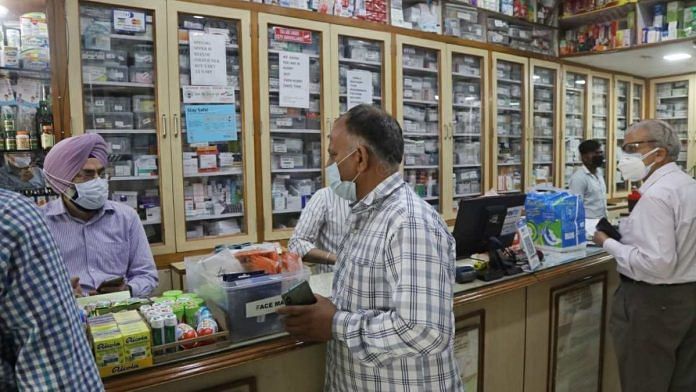New Delhi: Pharmaceutical companies should not organise conferences for doctors in foreign locations, offer gifts for personal benefit of any healthcare professional or their family members, extend hospitality like hotel stay, expensive cuisine, resort accommodation to healthcare professionals or their family members except to a person who is a speaker at a conference — these rules are among the new Uniform Code for Pharmaceutical Marketing Practices (UCPMP) notified by the government Tuesday.
The UCPMP 2024, which replaces the previous code that was first notified in 2015, also states that every brand reminder given to healthcare professionals should not exceed Rs 1,000 in value per item.
However, the new code, like its previous avatar, will remain voluntary in nature, with the implementation being watched by the Ethics Committee for Pharmaceutical Marketing Practices (ECPMP), a panel constituted by the pharma associations, though a special audit may be ordered by the department of pharmaceuticals when deemed fit.
The penalty, in case a company is found violating the prescribed ethical guidelines, is suspension from the association.
The pharma marketing code seeks to draw lines of “ethical relationships” between medical professionals and drugmakers.
The latest UCPMP is largely based on the recommendations by a committee headed by Dr V.K. Paul, member of the federal think tank NITI Aayog, which had submitted its report to the government in December last year.
It says that medical or sales representatives of pharma companies must not employ any inducement or subterfuge to gain an interview and they must not pay, under any guise, for access to a healthcare professional.
Also, according to the code, companies are responsible for the activities of their employees, including the medical representatives, for ensuring compliance of the UCPMP, which should additionally be ensured through an appropriate clause in the employment contract signed between the company and its medical representatives.
ThePrint reached Arunish Chawla, secretary, department of pharmaceuticals (DoP), via calls. This report will be updated if and when a response is received.
A senior official in the department, however, told ThePrint on condition of anonymity that the latest code “further strengthens the ethical boundaries governing the marketing practices by drugmakers.”
Also read: Health ministry asks NMC to defer minimum standards for medical colleges — ‘unrealistic’
Drawing boundaries
According to the new UCPMP, the engagement of pharmaceutical industry with the healthcare professionals for Continuing Medical Education (CME), Continuing Professional Development (CPD) or otherwise for conference, seminar and workshop should only be allowed through a well-defined, transparent, and verifiable set of guidelines based on which the pharmaceutical industry may undertake such expenditures.
Also, conduct of such events in foreign locations is prohibited but pharmaceutical companies, including their trusts or associations, either alone or in collaboration with professional bodies, institutions can organise such conferences in India.
All pharmaceutical companies, however, will be required to share the details of such events conducted by them, including the expenditures incurred thereupon, on their website, and may be subject to independent, random, or risk-based audit for this purpose.
In addition, all organisers of such events will need to explicitly spell out the procedure followed in the selection of participants and speakers, display a statement of their funding sources and expenditures on their website, and may be subject to special audit for this purpose.
Entities incurring expenditure on such events, as well as participants and speakers, must comply with the relevant provisions of the Income Tax Act, 1961, as amended from time to time, says the code.
To provide rational support and encouragement to research and innovation through the industry-academia linkage, interaction between pharmaceutical companies and healthcare professionals has been permitted, but these projects must be approved by the Indian Council of Medical Research or the Drug Controller General of India.
Under the code, engagement of healthcare professionals in consultant-advisory capacity can be for bona-fide research services, under a consultancy agreement involving a consultancy fee or an honorarium-based payment, subject to the relevant provisions of the Income-Tax Act, 1961.
It adds that expenditure on research by pharmaceutical companies is an allowable expenditure subject to the provisions of the Income Tax Act, as amended from time to time.
Tight regulation on relationship with doctors
The new code says that no gift should be offered or provided for personal benefit of any healthcare professional or family member by any pharmaceutical company or its agents, such as distributors, wholesalers and retailers.
Similarly, no pecuniary advantage or benefit in kind may be offered, supplied, or promised to any person qualified to prescribe or supply drugs, by any pharmaceutical company and they also cannot extend travel facilities inside or outside the country, including rail, air, ship, cruise tickets, paid vacations, to healthcare professionals or their family members for attending conferences, seminars, workshops unless the person is a speaker for a CME or a CPD Program.
Companies or their representatives, will also not be permitted to extend hospitality like hotel stay, expensive cuisine, resort accommodation to healthcare professionals or their family members except to a person who is a speaker for the conference.
The code also prohibits companies or their representatives from paying any cash or monetary grant to any healthcare professional under any pretext.
For handling the complaints against a drugmaker, the code has advised the associations to engage the services of professional auditors to “facilitate better and independent examination towards arriving at an informed decision”.
(Edited by Zinnia Ray Chaudhuri)



